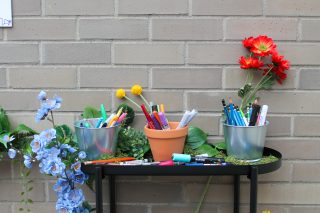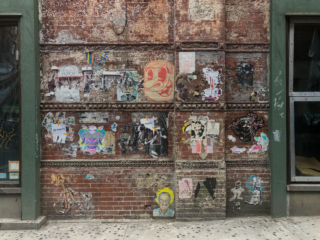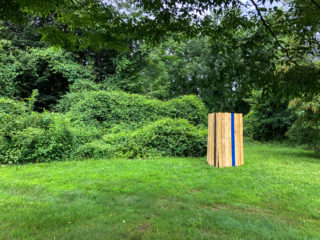
Yesterday Banksy held a “street party” intended as a mock celebration of the 100th anniversary of the Balfour Declaration—a statement issued by the British government during World War I that announced unequivocal support for a “national home for the Jewish people in Palestine.”
While the Israeli parliament is celebrating the anniversary, the Palestinians have called for an apology from the British. The original 67-word statement is largely credited as the first international step towards the creation of Israel in Palestine. Palestinians see it as an enormous betrayal, especially given a separate promise made to enlist the political and military support of the Arab community in World War I.
Banksy’s satirical celebration landed somewhere in the middle. Described as an “apology party” for Palestinians, the event included the unveiling of a new work by the artist. Banksy carved the words “Er… Sorry” into the West Bank barrier and the work was unveiled by an actor dressed as the Queen.
The party was protested by Palestinians who already have a conflicted relationship with Banksy and his Walled Off hotel in Bethlehem. People from the nearby Aida refugee camp told the Guardian that they objected to the overuse of the British flag and the way the event had used Palestinian children as the centerpiece of the event.

A statement by Banksy read aloud at the event made it clear that this was not intended to be a celebration:
“This conflict has brought so much suffering to people on all sides – it didn’t feel appropriate to ‘celebrate’ the British role. The British didn’t handle things well here. When you organise a wedding, it’s best to make sure the bride isn’t already married.”
But with flags and a cake, it’s hard to read it as a party that’s 100% ironic. And Banksy’s statement that the conflict brought suffering to people “on all sides” upset Palestinians whose statehood still hasn’t been explicitly recognized by the international community. While Banksy did in some way give Palestinians the British apology they’ve demanded, doing it in a space filled with Union Jacks and a fake Queen was off-putting to say the least. The children invited to the party from neighboring refugee camps were having a good time (it was a party after all), but their joy felt exploited. They just want to be kids and have fun without having to reckon with the layers of political strife embedded in Banksy’s “party.”




